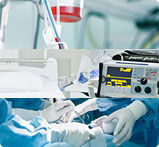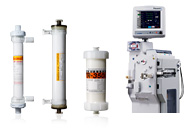Pemphigoid / Pemphigus
Pemphigus is an autoimmune dermatologic disease characterized by blistering of the skin and mucosa, often occurring in middle-aged or older people of both sexes. Pemphigoid is another autoimmune skin disease often observed in the elderly, characterized by skin blistering. Pemphigus and Pemphigoid are thought to result from serum autoantibodies directed against the epidermis, specifically keratinocytes in the surface layer.
Treatment for Pemphigus and Pemphigoid includes the administration of corticosteroids, immunosuppressants, and high-dose intravenous immunoglobulin (IVIg) and plasmapheresis. DFPP and PE remove autoantibodies to improve symptoms.
Post-operative hepatic failure
Post-operative hepatic failure results from various types of dysbolism due to hypofunction of hepatic cells after surgery. Symptoms of hepatic failure include hepatic coma caused by elevated plasma ammonia concentrations due to failure to metabolize urea, and jaundice caused by elevated plasma bilirubin concentrations due to the failure to excrete the bile.
In addition to nutritional management, CRRT or plasmapheresis is performed to support the patient until liver function is recovered.
Primary biliary cirrhosis
Renal failure is a state of impaired renal function with various etiologies. Waste and fluid that are normally excreted accumulate in the blood, and uremic symptoms occur with progression.
Acute renal failure is a sudden loss of renal function, triggered by renal disease or other factors. Waste products, such as urea and creatinine, rapidly accumulate in the blood. Continuous renal replacement therapy (CRRT) is performed to remove excess waste and fluid in parallel with treatment of the underlying disease.
Rapidly progressive glomerulonephritis (RPGN)
Rapidly progressive glomerulonephritis (RPGN) is a nephritic syndrome with poor prognosis resulting in rapid loss of renal function over weeks to months. Early symptoms include fatigue, fever, anorexia, upper respiratory tract inflammation, and arthralgia. Steroids and immunosuppressants are the primary treatment. However, when DFPP or PE is performed in combination with medication for conditions with poor prognosis, including anti-basement membrane antibody-induced disease or antineutrophil cytoplasmic antibody-positive (ANCA)-RPGN, significant improvements in prognosis are seen.
Rheumatoid arthritis (RA) with vasculitis
Rheumatoid arthritis (RA) with vasculitis is an intractable or severe form of RA accompanied by manifestations outside the joints, such as vasculitis. RA with vasculitis exhibits symptoms in the lungs, kidneys, heart, nerves, and eyes as well as the joints, in addition to severe arthritic symptoms including joint swelling and pain. The etiology is unknown. Clinical laboratory test results show immunologic abnormalities such as strongly positive rheumatoid factor (RF), high levels of C-reactive protein (CRP) indicating an inflammatory response, high erythrocyte sedimentation rate (ESR), and increased leukocyte count. Treatments for RA with vasculitis are medication, physical therapy, surgery, and plasmapheresis. Plasmapheresis removes RF and the RF-reactive factors (immune complexes) to improve symptoms.
Severe acute pancreatitis
Acute pancreatitis is a sudden-onset inflammation of the pancreas triggered by excessive alcohol intake, calculi, etc. Digestive enzymes secreted by the pancreas are activated and begin to digest the pancreatic tissue. In severe acute pancreatitis, complications develop involving critical organs such as the heart, lung, kidneys, and cranial nerves, resulting in multiple-organ failure.
Treatment includes the administration of protease inhibitors or antibiotics and nutritional management. CRRT is performed to remove excess fluid and protease.
Severe blood-type incompatible pregnancy
In severe blood-type incompatible pregnancy, maternal irregular antibodies passing through the placenta destroy fetal red blood cells, causing hemolysis. The hemolysis results in jaundice, hemolytic anemia, edema, congestive heart disease, hepatosplenomegaly, and fetal death. D (RhD and Rh-positive), Kell (K1), c, Duffy (Fya), and Kidd (Jka and Jkb) antigens are particularly problematic.
The usual treatment for maternal-fetal severe blood type incompatibility after 18 weeks of pregnancy is intrauterine fetal blood transfusion under ultrasound guidance. However, in early pregnancy before 18 weeks, plasmapheresis is performed to reduce the irregular antibodies in the maternal blood. Many studies have reported the effectiveness of double filtration plasmapheresis (DFPP) using a plasma separator and plasma exchange (PE) in treating maternal-fetal severe blood type incompatibility.
Sudden sensorineural hearing loss (SSHL)
Patients with SSHL experience sudden deafness. The etiology is unknown, but may involve circulatory disorders, viral infection, allergic reaction, etc. In most cases, deafness occurs only in one ear, and patients remember correctly when the symptoms, consisting of tinnitus and occasionally vertigo, began. The extent of hearing loss rarely progresses, and after approximately 1 month the symptoms stabilize. Patients are advised to rest and relax and SSHL resolves naturally. Steroids, vitamins, etc. can be administered. A recent study has shown that Rheopheresis to improve the microcirculation contributes to a better outcome in SSHL patients.
Systemic lupus erythematosus (SLE)
Systemic lupus erythematosus (SLE) is a systemic chronic inflammatory disease thought to be caused by an autoimmune reaction. Dysfunction of the immune system injures cells and tissues, causing inflammation in various parts of the body including the skin and joints. The wide range of SLE symptoms include epilation, cerebrovascular disorders, pneumonia, myocarditis, polyarthritis, renal injury, and peripheral neuropathy. The possible etiology of the disease is related to the anti-double-strand DNA antibody and immune complex. Plasmapheresis to remove these factors is an established treatment for SLE.
Thrombotic thrombocytopenic purpura (TTP)
"Purpura" is a general term for diseases characterized by purple staining of the skin or mucosa. The staining is caused by bleeding vessels near the skin or mucosal surface, which appears purple. The major causes are 1) vessel abnormality and 2) decrease in or abnormality of platelets. Thrombotic thrombocytopenic purpura (TTP) is a very rare disease caused by a decrease in the platelet count. The precise etiology of TTP is unknown, but small blood clots form in arterioles/capillary vessels throughout the body and numerous platelets are recruited for clotting, thus decreasing the platelet count. Symptoms include the subcutaneous/mucosal bleeding common in purpura, fever, hemolytic anemia, kidney failure, and neuropsychological disorders.
DFPP or PE is performed to eliminate causal factors and stimulate platelet-activating factor production.
Toxic epidermal necrolysis (TEN)
In toxic epidermal necrolysis (TEN), multiple large blisters form on the skin due to an allergic reaction to medication or infection. TEN occurs primarily in children and adolescents and the mortality rate is high. Treatment includes the administration of corticosteroids, high-dose IVIg and antibiotics, and plasmapheresis. DFPP and PE remove autoantibodies to improve symptoms.
Please feel free to send us any questions you may have about our products and support.
Share your feelings and experiences when using our products.





